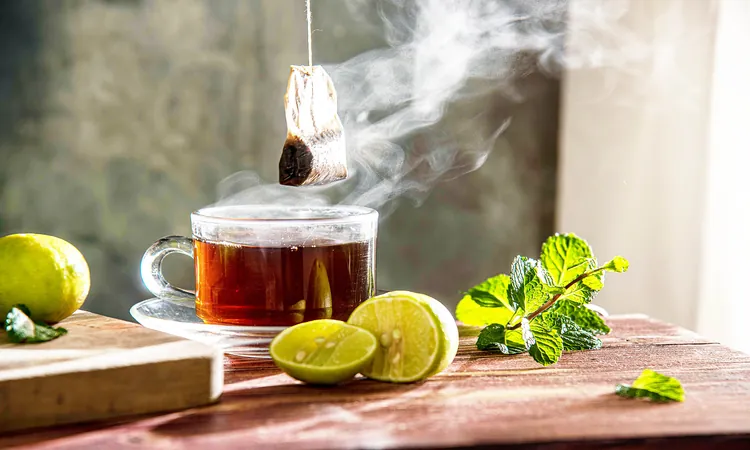
Shocking Discovery: Tea Bags Could Be Polluting Your Drink with Billions of Microplastics!
2024-12-23
Author: Ling
In what could be a tea lover's worst nightmare, a study conducted by scientists at the Universitat Autònoma de Barcelona (UAB) has revealed that the process of brewing tea with commercial tea bags may release an astounding number of nanoplastics and microplastics into our favorite beverage.
The groundbreaking research, performed by the Mutagenesis Group in the UAB Department of Genetics and Microbiology, indicates that polymer-based tea bags contribute significantly to the contamination of our drinks with these tiny plastic particles. Alarmingly, the study found that these particles can even be absorbed by human intestinal cells, potentially making their way into our bloodstream and throughout our bodies.
The Startling Numbers
This study unveils some shocking statistics:
- **Polypropylene bags** released approximately **1.2 billion plastic particles per milliliter**, averaging **136.7 nanometers** in size.
- **Cellulose materials** released around **135 million particles per milliliter**, with an average size of **244 nanometers**.
- **Nylon-6 tea bags** emitted **8.18 million particles per milliliter**, averaging **138.4 nanometers**.
These findings underscore the urgent need for awareness concerning plastic exposure in everyday products, particularly tea bags.
How Was This Discovered?
Researchers utilized advanced analytical techniques, including **scanning electron microscopy (SEM)**, **transmission electron microscopy (TEM)**, and **nanoparticle tracking analysis (NTA)**. These powerful tools facilitated a thorough examination of the structure and behavior of the particles, allowing scientists to highlight their potential health impacts.
“This innovative characterization of pollutants is crucial for advancing research on their implications for human health,” stated UAB researcher Alba Garcia.
The Health Perks of Tea... or Maybe Not?
While drinking tea is often associated with numerous health benefits, including antioxidants that fight harmful free radicals and compounds promoting brain health, the hidden plastic problem puts a shadow over this soothing ritual.
Tea is known to help with relaxation and digestion, but can we truly enjoy its benefits if we're also sipping on microplastics? The contradictions are troubling, as herbal teas like chamomile and peppermint can provide calmness, while we may be unknowingly consuming plastic particles.
New Findings on Human Health Risks
In a groundbreaking experiment, researchers traced how these microplastics interacted with human intestinal cells in the lab. They found that mucus-producing cells absorbed the most plastic particles, raising alarms about the potential implications for gut health. More concerning was the observation that some particles penetrated cell nuclei, which could disrupt genetic functioning and lead to long-term health issues.
Call to Action: Regulation Needed!
Given these unsettling findings, experts are now calling for immediate regulatory measures to combat MNPL contamination in food packaging. Garcia emphasized the necessity for standardized test methods and effective policies to mitigate this contamination and safeguard public health.
“As the use of plastic in food packaging skyrockets, addressing MNPL contamination should be paramount for food safety,” she urged.
Make Informed Choices
Tea drinkers have another reason to rethink their choices. The study highlights a rarely considered source of plastic pollution—an often-innocent beverage could be causing harm while we sip away. By understanding these risks and advocating for changes in product regulations, we can work toward a healthier future.
This critical research, published in the journal *Chemosphere*, serves as a wake-up call for consumers and policymakers alike. As we navigate through a world filled with plastic, it’s high time we take action to reduce its presence in our lives.
Stay informed, and consider switching to loose-leaf teas or exploring alternatives that prioritize environmental health alongside personal well-being!



 Brasil (PT)
Brasil (PT)
 Canada (EN)
Canada (EN)
 Chile (ES)
Chile (ES)
 España (ES)
España (ES)
 France (FR)
France (FR)
 Hong Kong (EN)
Hong Kong (EN)
 Italia (IT)
Italia (IT)
 日本 (JA)
日本 (JA)
 Magyarország (HU)
Magyarország (HU)
 Norge (NO)
Norge (NO)
 Polska (PL)
Polska (PL)
 Schweiz (DE)
Schweiz (DE)
 Singapore (EN)
Singapore (EN)
 Sverige (SV)
Sverige (SV)
 Suomi (FI)
Suomi (FI)
 Türkiye (TR)
Türkiye (TR)